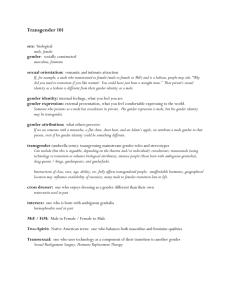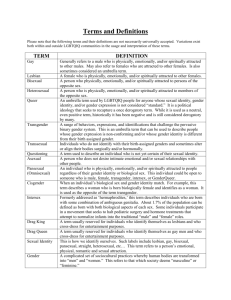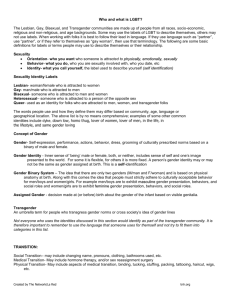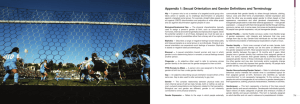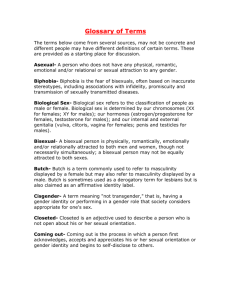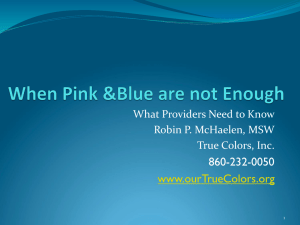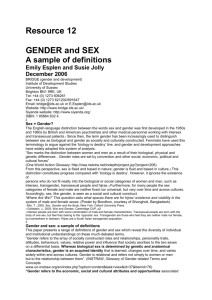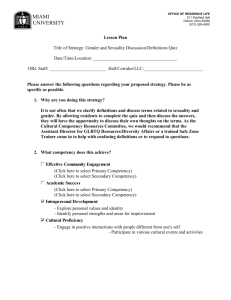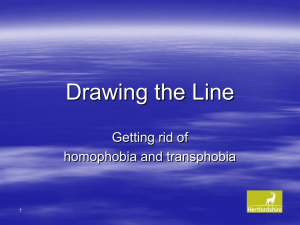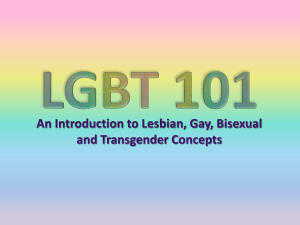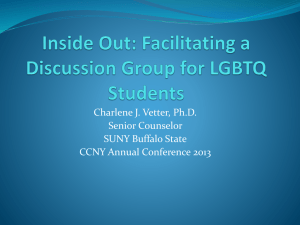LGBTIQA terminology - University of Derby
advertisement
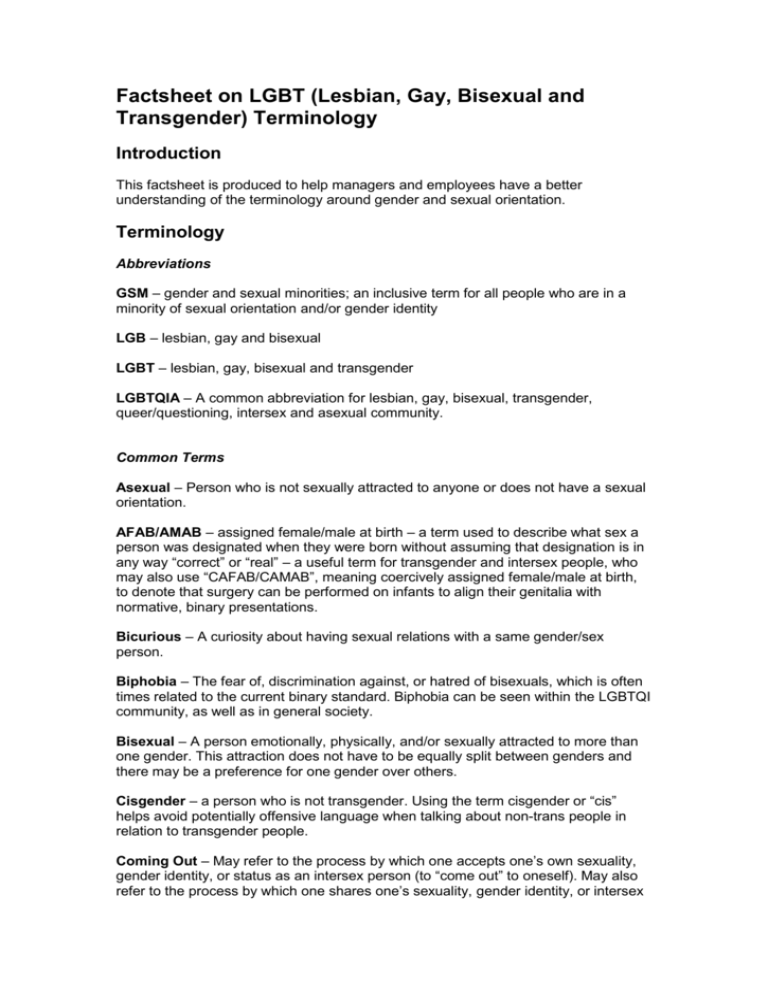
Factsheet on LGBT (Lesbian, Gay, Bisexual and Transgender) Terminology Introduction This factsheet is produced to help managers and employees have a better understanding of the terminology around gender and sexual orientation. Terminology Abbreviations GSM – gender and sexual minorities; an inclusive term for all people who are in a minority of sexual orientation and/or gender identity LGB – lesbian, gay and bisexual LGBT – lesbian, gay, bisexual and transgender LGBTQIA – A common abbreviation for lesbian, gay, bisexual, transgender, queer/questioning, intersex and asexual community. Common Terms Asexual – Person who is not sexually attracted to anyone or does not have a sexual orientation. AFAB/AMAB – assigned female/male at birth – a term used to describe what sex a person was designated when they were born without assuming that designation is in any way “correct” or “real” – a useful term for transgender and intersex people, who may also use “CAFAB/CAMAB”, meaning coercively assigned female/male at birth, to denote that surgery can be performed on infants to align their genitalia with normative, binary presentations. Bicurious – A curiosity about having sexual relations with a same gender/sex person. Biphobia – The fear of, discrimination against, or hatred of bisexuals, which is often times related to the current binary standard. Biphobia can be seen within the LGBTQI community, as well as in general society. Bisexual – A person emotionally, physically, and/or sexually attracted to more than one gender. This attraction does not have to be equally split between genders and there may be a preference for one gender over others. Cisgender – a person who is not transgender. Using the term cisgender or “cis” helps avoid potentially offensive language when talking about non-trans people in relation to transgender people. Coming Out – May refer to the process by which one accepts one’s own sexuality, gender identity, or status as an intersex person (to “come out” to oneself). May also refer to the process by which one shares one’s sexuality, gender identity, or intersex status with others (to “come out” to friends, etc.). This can be a continual, life-long process for gay, lesbian, bisexual, transgender, asexual and intersex individuals. Crossdresser/ Freedresser – Somebody who wears clothing that falls outside of what is expected for their gender. Some identify as trans, some do not, depending on whether their dress is an aspect of their gender identity. “Transvestite” is now falling out of usage. Discrimination – occurs when members of a more powerful social group behave unjustly, cruelly or in an excluding or marginalising way to members of a less powerful social group. Discrimination can take many forms, including both individual acts of hatred or injustice and institutional denials of privileges normally accorded to other groups. Ongoing discrimination creates a climate of oppression for the affected group. Drag queen/king – someone who dresses as the opposite sex for performance purposes. This term does not place people in either the LGB or trans communities. Gay – Term used in some cultural settings to represent males who are attracted to males in a romantic, erotic and/or emotional sense. Not all men who engage in “homosexual behaviour” identify as gay, and as such this label should be used with caution. An alternative term is MSM; “men who have sex with men”. Some women also use the term gay, but “lesbian” is more generally used for women. Gender Binary – The idea that there are only two genders – male/female or man/woman and that a person must be strictly gendered as either/or. (See also ‘Identity Sphere.’) Gender Dysphoria – Gender dysphoria is a diagnosable condition in DSMV (“disorder” condition has now gone). It is not simply gender non-conformity, but “clinically significant distress” due to a persistent mismatch between assigned gender/sex and gender identity/subconscious sex. Gender Identity – A person’s private sense, and subjective experience, of their own gender. This may or may not align with the sex or gender a person was assigned at birth. Gender Normative – A person who by nature or by choice conforms to gender based expectations of society. (Also referred to as ‘Genderstraight’.) Gender Recognition Certificate – a person’s gender identity can be recognised if they are over 18, have lived as their gender for 2 years and been diagnosed with gender dysphoria. Gender Variant – A person who either by nature or by choice does not conform to gender-based expectations of society. Heteronormativity—The assumption, in individuals or in institutions, that everyone is heterosexual, and that heterosexuality is superior to homosexuality and bisexuality. Heterosexism – Prejudice against individuals and groups who display non heterosexual behaviours or identities, combined with the majority power to impose such prejudice. Usually used to the advantage of the group in power. Any attitude, action, or practice – backed by institutional power – that subordinates people because of their sexual orientation. Heterosexual – A person primarily emotionally, physically, and/or sexually attracted to members of the opposite sex. Heterosexual Privilege –Those benefits derived automatically by being heterosexual that are denied to homosexuals and bisexuals. Also, the benefits homosexuals and bisexuals receive as a result of claiming heterosexual identity or denying homosexual or bisexual identity. HIV-phobia – The irrational fear or hatred of persons living with HIV/AIDS. Homophobia – The irrational fear or hatred of homosexuals, homosexuality, or any behavior or belief that does not conform to rigid sex role stereotypes. It is this fear that enforces sexism as well as heterosexism. Homosexual – A person primarily emotionally, physically, and/or sexually attracted to members of the same sex. Some gay people find this term offensive or overly clinical if used in a non-clinical context. Identity Sphere – The idea that gender identities and expressions do not fit on a linear scale, but rather on a sphere that allows room for all expression without weighting any one expression as better than another. Intersex – a general term used for a variety of conditions in which a person is born with a reproductive or sexual anatomy that doesn’t fit the typical definitions of female or male. E.g. a person female-appearing on the outside, but with male-typical anatomy on the inside. Or a person may be born with genitals that seem to be inbetween the usual male and female types (in many cases, surgery is performed on infants to align their genitalia with more typical male or female anatomy). Or a person may be born with mosaic genetics, so that some of their cells have XX chromosomes and some of them have XY. Many intersex conditions lie unseen until puberty, and some are only discovered after a person dies. The term “hermaphrodite” is not acceptable for intersex people but is correctly used in nature for some species. In the Closet – Refers to a GSM person who will not or cannot disclose their sex, sexuality, sexual orientation or gender identity to their friends, family, co-workers, or society. An intersex person may be closeted due to ignorance about their status since standard medical practice is to “correct,” whenever possible, intersex conditions early in childhood and to hide the medical history from the patient. There are varying degrees of being “in the closet”; for example, a person can be out in their social life, but in the closet at work, or with their family. Lesbian – Term used to describe female-identified people attracted romantically, erotically, and/or emotionally to other female-identified people. The term lesbian is derived from the name of the Greek island of Lesbos and as such is sometimes considered a Eurocentric category that does not necessarily represent the identities of African-Americans and other non-European ethnic groups. This being said, individual female-identified people from diverse ethnic groups, including AfricanAmericans, embrace the term ‘lesbian’ as an identity label. MTF/FTM – male to female, female to male, describes the direction of transition Non-binary – many transgender people identify outside of the “gender binary”, i.e they do not experience themselves as entirely male or female – there are a variety of terms for this, including agender, bigender, pangender gender fluid, androgyne, neutrois and genderqueer. Outing – Involuntary disclosure of one’s sexual orientation, gender identity, or intersex status. Outing another person is seen as disrespectful and potentially dangerous or discriminatory to the individual. Pansexual – A person who is sexually attracted to all or many gender expressions. Passing – A term used to describe how a member of the GSM community might not be visibly recognised as a member of that community. For instance, a gay person who appears heterosexual or a transgender person who “passes” as cisgender. Such people may experience less prejudice, as a result, but may also experience a lack of recognition. Not all transgender people consider that passing is the goal of transition, but for many it makes life much safer and more comfortable. Prejudice – A conscious or unconscious negative belief about a whole group of people and its individual members. Pronouns – It is polite to ask transgender people what their preferred pronouns are, rather than making an assumption based on their appearance, as not everybody “passes” as their identified gender. Many non-binary trans people prefer gender neutral pronouns, such as singular they/them/their or other individual pronouns they have chosen. Queer – An umbrella term for the GSM community. For decades ‘queer’ was used as a derogatory adjective for gays and lesbians, but in the 1980s the term began to be reclaimed by GSM people as a term of self-identification. Many people might still hold ‘queer’ to be a hateful insult, and its use by heterosexuals is often considered offensive. Similarly, other reclaimed words are usually offensive to the in-group when used by outsiders, so extreme caution must be taken concerning their use when one is not a member of the group. Sex - A medical term designating a certain combination of gonads, chromosomes, external gender organs, secondary sex characteristics and hormonal balances. Because usually subdivided into ‘male’ and ‘female’, this category does not recognize the existence of intersex bodies. The assignment of a sex at birth, based on external appearance of genitalia, is also problematic for transgender people, who may not experience alignment with what was assigned. Sex Identity – How a person identifies physically: female, male, in between, beyond, or neither. Sexual Orientation – The desire for intimate emotional and/or sexual relationships with people of the same gender/sex, another gender/sex, or multiple genders/sexes. Sexual Reassignment Surgery (SRS) – A term used by some medical professionals to refer to a group of surgical options that alter a person’s primary and secondary sexual characteristics to align with their gender identity. Not all transgender people have any surgery; some undergo hormone replacement therapy to induce the secondary sexual characteristics of their identified gender, without having surgery, and some transgender people choose not to have any medical treatment at all. In the UK a person may be legally recognised as their identified gender without surgery. “Gender Confirmation Surgery.” Is seen as a more accurate term that moves us away from old fashioned ideas of “changing sex”. Sexuality – A person’s exploration of sexual acts, sexual orientation, sexual pleasure, and desire. Stereotype – A preconceived or oversimplified generalisation about an entire group of people without regard for their individual differences. Though often negative, can also be complimentary. Even positive stereotypes can have a negative impact, however, simply because they involve broad generalizations that ignore individual realities. Straight – Another term for heterosexual. Trans - An abbreviation that is sometimes used to refer to a gender variant person. This term is sometimes used to refer to the gender variant community as a whole, in which case it may appear with an asterisk to denote inclusivity: Trans*. Transgender – (never use “transgendered”) – Somebody whose assigned gender does not match their gender identity (not everyone will use this term). Transgender people can be gay, straight, bisexual or asexual - sexual orientation is not dependent on gender identity. Transhate – The irrational hatred of those who are gender variant, sometimes expressed through violent and often deadly means. Transition – This term is primarily used to refer to the process a gender variant person undergoes when changing their appearance and/or body either to be more congruent with the gender/sex they feel themselves to be and/or to be in harmony with their preferred gender expression. Trans man/ woman – a trans man’s gender identity is male; a trans woman is a woman, and you could also simply say “man” or “woman” – trans is just an adjective denoting someone’s history and should only be used with the person’s permission. Transphobia – The irrational fear of those who are gender variant and/or the inability to deal with gender ambiguity. It is this fear that reinforces cissexism, which are ideas that revolve around cisgender priorities and exclude consideration of trans people. Transsexual – A person who identifies psychologically as a gender/sex other than the one to which they were assigned at birth. Transsexuals often wish to transform their bodies hormonally and surgically to match their inner sense of gender/sex. Further Sources of Information You might it useful to read the University guidance “Supporting our LGB Employees” and “Guidance for Managers: Supporting Lesbian, Gay and Bisexual Employees”.
